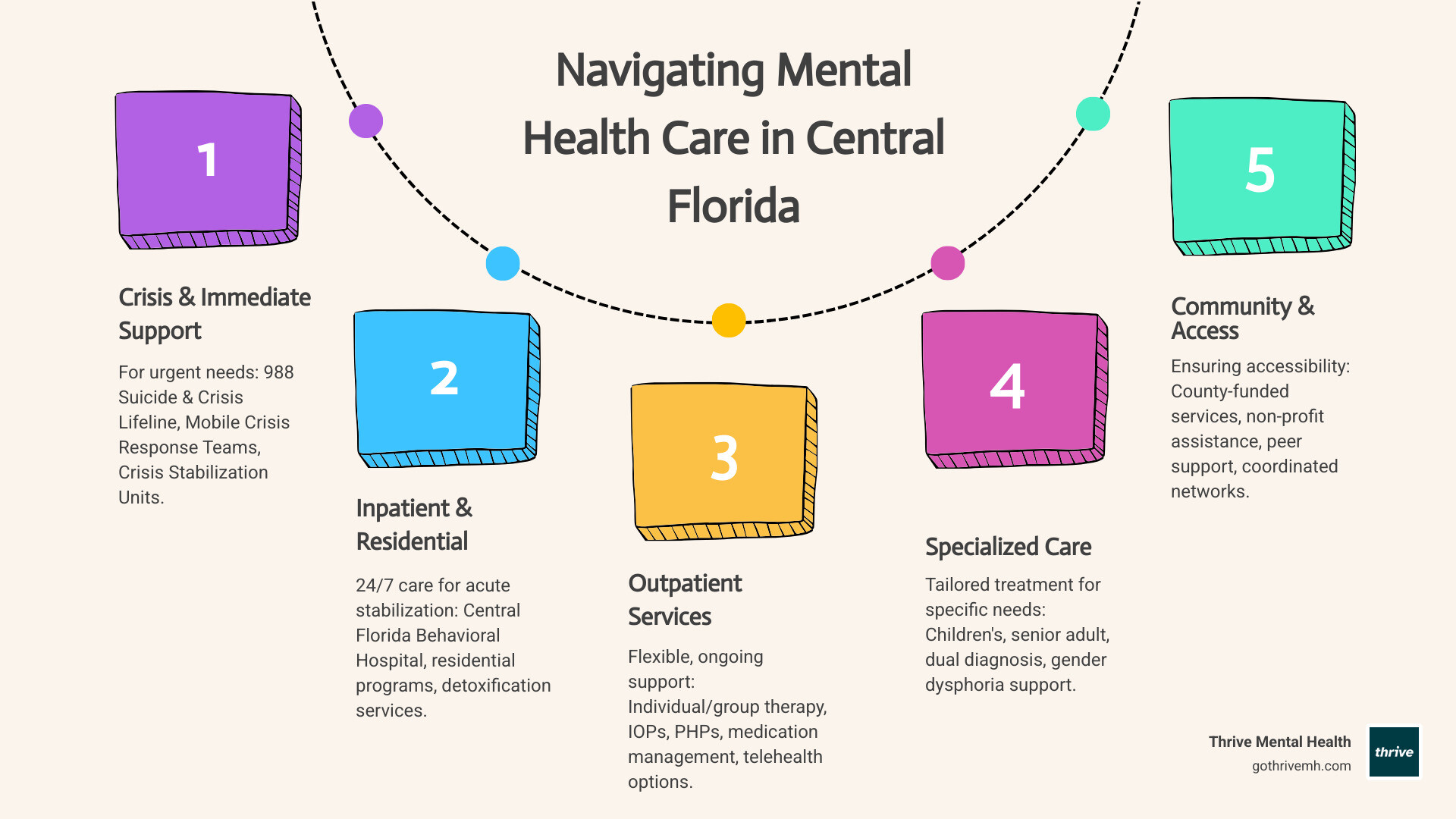Finding Peace of Mind in Central Florida – A Local’s Guide

Finding the Right Mental Health Support in Central Florida
Central Florida mental health services offer a comprehensive network of care options for diverse community needs. Whether you need crisis support, ongoing therapy, or specialized treatment, the region provides multiple pathways to recovery.
Quick Access Guide to Central Florida Mental Health Services:
- Crisis Support: 988 Suicide & Crisis Lifeline, Mobile Crisis Response Teams, Crisis Stabilization Units
- Inpatient Care: Local behavioral hospitals, residential treatment programs, detoxification services
- Outpatient Services: Individual therapy, group counseling, Intensive Outpatient Programs (IOP), Partial Hospitalization Programs (PHP)
- Specialized Care: Children’s programs, senior adult services, dual diagnosis treatment, gender dysphoria support
- Free/Low-Cost Options: Mental Health Association of Central Florida, county-funded programs, Outlook Clinic
- Coordinated Networks: Central Florida Behavioral Health Network, regional managing entities, peer support programs
Central Florida’s mental health landscape includes everything from immediate crisis intervention to long-term therapeutic support. The region serves multiple counties with coordinated care networks, ensuring individuals can access appropriate services regardless of their insurance or specific needs.
The numbers tell the story: The Mental Health Association of Central Florida helps over 4,200 families annually connect to mental health services, while regional facilities report high patient satisfaction scores for treatment effectiveness.
I’m Nate Raine, CEO of Thrive Mental Health, and I’ve spent over a decade in healthcare innovation and behavioral health. My experience championing accessible Central Florida mental health solutions has given me deep insight into how our regional networks can better serve individuals seeking care.

Understanding the Spectrum of Care in Central Florida
Mental health care isn’t one-size-fits-all. Central Florida mental health services recognize this by offering a comprehensive continuum of support that meets people where they are in their healing journey. Think of it as a safety net with multiple layers, designed to provide the right level of care for your specific needs.
Understanding your options empowers you to make informed decisions. From 24/7 crisis intervention to flexible outpatient programs, the spectrum ensures no one falls through the cracks. Technology has also made quality care more accessible than ever. To explore how digital innovations are changing treatment, check out The Role of Technology in Improving Digital Mental Health Outcomes in Florida.
Immediate and Crisis Support
When mental health emergencies strike, Central Florida has a robust network of immediate support services operating around the clock.
The 988 Suicide & Crisis Lifeline is your first line of defense. Available 24/7 via call or text, this national service connects you with trained counselors for immediate emotional support and local resources.
211 services are another vital lifeline, serving as a gateway to community resources. Dialing 211 connects you with staff who can guide you to appropriate mental health support and other essential services.
Mobile Response Teams bring professional help directly to you. Local organizations operate these teams 24/7, dispatching trained professionals to de-escalate crises in familiar surroundings and assess immediate needs.
For more intensive intervention, Crisis Stabilization Units (CSUs) provide specialized inpatient care. These units offer a safe environment for adults in severe crisis who cannot care for themselves or may be a risk to themselves or others.
Inpatient and Residential Programs
Sometimes healing requires stepping away from daily life to focus on recovery. Inpatient and residential programs provide intensive, 24/7 support for acute stabilization, detoxification, and comprehensive treatment when outpatient care isn’t enough.

These programs create a structured environment for all age groups, addressing both mental health conditions and substance abuse treatment. The focus on dignity and respect is reflected in high patient satisfaction scores.
Residential programs extend beyond crisis stabilization. Some offer stable housing after detoxification, providing therapy, case management, and support with employment and housing transitions. For individuals experiencing homelessness with mental health or substance abuse challenges, specialized programs provide stable living environments for up to a year.
These programs emphasize structured routines, intensive therapy, and supportive communities to foster long-term well-being.
Outpatient and Community-Based Services
For those who don’t require inpatient care, outpatient services provide the flexibility to maintain daily life while receiving treatment. Healing happens in the context of your everyday experiences.
Individual and group therapy form the cornerstone of outpatient care, offering personalized support and the healing power of shared experiences. Many providers offer these services alongside medication management and psychiatric assessments.
Partial Hospitalization Programs (PHP) and Intensive Outpatient Programs (IOP) bridge the gap between inpatient and weekly therapy. PHPs require more time, serving as a step-down from inpatient care, while IOPs offer robust support that accommodates work or school.
Virtual IOP options have revolutionized accessibility. At Thrive Mental Health, we specialize in virtual IOP and PHP programs for adults and young professionals, offering flexible, expert-led care from anywhere. This format ensures you can access treatment without disrupting your commitments.
Telehealth access allows connections with therapists from home, which is crucial for those with busy schedules or transportation challenges. Outpatient settings treat a range of conditions, including depression, anxiety, ADHD, grief, gender dysphoria, and substance use disorders.
Navigating Central Florida Mental Health Resources by Need
Every mental health journey is unique. Central Florida mental health services are designed to meet people where they are, with specialized programs for every age, need, and financial situation. Understanding what’s available is the key to finding the right care. For guidance on selecting the best therapeutic fit, explore Choosing Ideal Therapist in Florida.
Specialized Support for Children and Adolescents
Children and teens need specialized care that addresses their unique developmental needs, and Central Florida has a strong network of pediatric mental health services.
An innovative example is the Central Florida Behavioral Health Hub (CFL-BHH), a collaborative network serving children and adolescents across several counties. The Hub supports families and healthcare providers by offering “Doc-2-Doc” consultations, giving pediatricians access to expert mental health advice. It also provides free care coordination for children, regardless of insurance, helping families steer the system.
Parent training programs are also available, offering support for caregivers of children with ADHD and other behavioral concerns. The Mental Health Association of Central Florida further supports this effort with its Connections Referral Program, helping over 4,200 families annually connect to youth mental health services.
Custom Programs for Adults and Seniors
Adult mental health needs are diverse, and Central Florida offers programs for every life stage. From young professionals managing stress to seniors facing late-life depression, specialized services are available.
Many facilities offer dual diagnosis treatment, addressing co-occurring mental health and substance abuse issues. Affective disorders like depression and bipolar disorder receive specialized attention, with some facilities offering advanced treatments for severe cases.
The region also provides support for specific populations, with services for gender dysphoria and perinatal mood and anxiety disorders. Adult programs commonly address a wide range of issues, including depression, anxiety, ADHD, trauma, grief, and relationship conflicts, ensuring comprehensive care is available.
For more information about adult services statewide, Florida Adult Mental Health provides additional resources.
Accessibility for Limited-Resource Individuals
Financial barriers shouldn’t prevent anyone from getting help. Central Florida has multiple pathways to support individuals with limited resources.
County-funded services, often through non-profit partnerships, provide crucial access to care. This includes programs for medication management for uninsured individuals, ensuring access to vital psychiatric medications.
The Outlook Clinic, operated by the Mental Health Association of Central Florida, is the region’s only free mental health clinic, providing essential no-cost care.
For individuals experiencing homelessness, specialized housing programs offer stable living environments coupled with mental health and substance abuse support, recognizing that housing is often key to recovery.
The Mental Health Association’s Connections Referral Program is a lifeline for thousands, guiding families to low-cost or free options. Furthermore, the Guardian Advocate program provides legal advocacy for vulnerable individuals in behavioral health hospitals, ensuring their rights are protected.
These programs show Central Florida’s commitment to making mental health care available to everyone.
The Coordinated Network: How Services Work Together
The strength of Central Florida mental health services lies in how they work together. This interconnected system of managing entities, public services, and community partnerships ensures you get the right care at the right time. For questions about insurance coverage, A Comprehensive Guide to Insurance Plans in Florida can help you understand your options.
Regional Hubs and Managing Entities
Central Florida’s mental health system is built around regional networks to ensure no one falls through the cracks. The Central Florida Behavioral Health Network (CFBHN) oversees publicly funded mental health and substance abuse services across 14 counties. As a managing entity, it contracts with community providers to deliver quality care.
This system is founded on Recovery Oriented Systems of Care (ROSC) principles, which put you in control of your recovery journey. It emphasizes choice, support, and the crucial role of peers with lived experience. Through this network, you can access everything from crisis care to housing assistance.
The Power of Peer Support and Advocacy
Connecting with someone who understands your experience can be incredibly healing. Peer support is a cornerstone of Central Florida mental health services.
Peer support programs create supportive communities where people with shared experiences can connect, share their stories, and focus on recovery together. This non-clinical approach fills gaps that traditional therapy sometimes can’t, offering instant understanding and empowerment.
The network also includes strong advocacy to protect your rights. The Guardian Advocate program is a key example. When individuals are involuntarily committed and have no family available, organizations like the Mental Health Association of Central Florida step in to ensure their voice is heard and rights are protected. This dedication shows the network’s commitment to treating every person with dignity.
Beyond Treatment: Prevention, Education, and Wellness
A mentally healthy community is built on more than just treatment. Central Florida mental health initiatives focus on proactive wellness, prevention, and education to reduce stigma, strengthen community bonds, and build resilience. For insights into innovative approaches that support wellness, consider Integrating Art into Intensive Outpatient Programs in South Florida: A Closer Look.
Your Guide to Central Florida Mental Health Education
Education is the backbone of a mentally healthy community. When people understand mental health, they are more likely to seek help and support others.
Public awareness campaigns, such as “You Are Not A Burden” and “Show Up For Yourself,” help normalize conversations about mental health. Led by organizations like Central Florida Cares Health System (CFCHS), these initiatives encourage people to seek help without shame.
The Mental Health Association of Central Florida (MHACF) offers extensive Mental Health Wellness & Education resources, including innovative art therapy programs.
Mental Health First Aid training empowers community members to recognize mental health struggles and provide initial support, turning everyday people into allies.
School programs are crucial for reaching young people early, teaching them that mental health is as important as physical health. The Central Florida Behavioral Health Network (CFBHN) also promotes wellness through creative outlets like radio segments and community workshops.
Proactive Prevention for a Healthier Community
Effective prevention involves training providers, supporting parents, and building healthier workplace cultures.
Provider training helps healthcare professionals recognize mental health concerns early. The Central Florida Behavioral Health Hub’s “Doc-2-Doc” consultations give pediatric providers expert guidance, ensuring children get better care faster.
Parent education programs give caregivers practical tools to recognize warning signs, communicate effectively, and create supportive home environments.
Early intervention and skill-building workshops teach practical techniques for managing stress and building resilience. Workplace wellness programs are also growing as employers recognize the importance of supporting employee mental health.
Many local mental health providers integrate psychoeducation into their services, helping people understand their conditions and develop long-term wellness strategies. By investing in prevention, Central Florida is building a community where seeking help is a sign of strength.
Frequently Asked Questions about Central Florida Mental Health
Navigating mental health care can bring up questions. Here are clear answers to some of the most common ones about Central Florida mental health services.
How do I find mental health services if I don’t have insurance?
Lack of insurance should not stop you from getting care. Central Florida has several options for uninsured individuals.
- Non-profit organizations: The Outlook Clinic, run by the Mental Health Association of Central Florida, is the region’s only free mental health clinic. Their Connections Referral Program also helps thousands of families find care annually.
- County-funded services: Many counties fund services through regional networks, offering care regardless of your ability to pay.
- 211 Helpline: Dial 211 to connect with a guide who can direct you to local low-cost and free mental health resources.
What is the difference between an IOP and a PHP?
Both Intensive Outpatient Programs (IOP) and Partial Hospitalization Programs (PHP) offer structured support without an overnight stay, but they differ in intensity.
A PHP is more intensive, typically involving 5-6 hours of daily programming, five days a week. It’s often a step-down from inpatient care, providing comprehensive treatment while you return home each evening.
An IOP offers more flexibility, with 3-4 hours of therapy, 3-5 days per week. This structure allows you to maintain work, school, or family life. At Thrive Mental Health, our virtual IOP and PHP programs make this care even more accessible for adults and young professionals.
What should I do in a mental health emergency in Central Florida?
Knowing what to do in a crisis is life-saving. Here are the steps to take:
- For immediate, life-threatening emergencies, always call 911. This is for situations involving active suicide attempts or immediate physical danger.
- For urgent crisis support, call or text the 988 Suicide & Crisis Lifeline. It’s available 24/7 and connects you with trained crisis counselors for immediate support and local resources.
- For local crisis help, dial 211 and press 3. This connects you to Central Florida-specific resources, including Mobile Crisis Response Teams that can come to your location to de-escalate the situation.
Conclusion
Your journey toward better mental health doesn’t have to be traveled alone. Central Florida mental health services create a comprehensive safety net, from crisis intervention to long-term recovery. Whether you need the 988 Lifeline, residential care, or flexible outpatient therapy, the region’s coordinated networks ensure you won’t fall through the cracks.
The diverse resources available address every life stage and financial situation, with specialized programs for children, adults, and seniors. If cost is a concern, free clinics and county-funded programs ensure help is always within reach. More than just treatment, Central Florida focuses on prevention and education, building a culture where seeking help is a sign of strength.
At Thrive Mental Health, we are proud to be part of this ecosystem. Our expert-led virtual care through Intensive Outpatient and Partial Hospitalization programs provides evidence-based treatment from anywhere in Central Florida. We meet you where you are with flexible scheduling that fits your life.
The path to holistic well-being is possible with this network of support. For those looking to improve their support options, learn more about Enhancing mental health support with Evernorth.
Taking the first step can feel overwhelming, but you’re not just reaching out for help—you’re connecting with a community that believes in hope and recovery. That support is real, accessible, and waiting for you in Central Florida.

